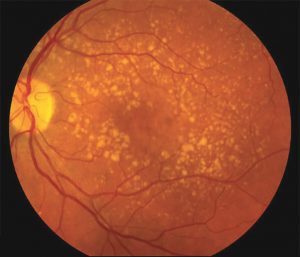Dr. Katia Taba, Board-Certified Ophthalmologist and Retinal Specialist
 Age-related macular degeneration (AMD) remains a prevalent concern for individuals over 50, affecting their vision and quality of life. This progressive eye condition gradually damages the macula, the central portion of the retina, leading to blurred or distorted vision and, in severe cases, vision loss. The impact of AMD on daily life can be profound, affecting activities like reading, driving, and recognizing faces.
Age-related macular degeneration (AMD) remains a prevalent concern for individuals over 50, affecting their vision and quality of life. This progressive eye condition gradually damages the macula, the central portion of the retina, leading to blurred or distorted vision and, in severe cases, vision loss. The impact of AMD on daily life can be profound, affecting activities like reading, driving, and recognizing faces.
However, in recent years, significant advancements in treatment options have sparked hope for those grappling with AMD. Traditional treatments, such as anti-VEGF injections, remain crucial in managing AMD. These injections target the abnormal blood vessel growth that characterizes the more severe form of the disease, known as “wet” AMD. They have been successful in slowing down vision loss and, in some cases, even restoring vision.
Yet, the landscape of AMD treatments is evolving rapidly, offering new avenues beyond the conventional approaches. One such promising development involves the use of gene therapy. This cutting-edge treatment aims to address the underlying genetic factors contributing to AMD, potentially offering more targeted and long-term solutions.
Another groundbreaking area is stem cell therapy. While still in the experimental stage, researchers are exploring the potential of stem cells to replace damaged cells in the retina, thereby restoring vision. Although this avenue requires further extensive research, it holds immense promise for revolutionizing AMD treatment in the future.
Furthermore, innovative drug therapies are under investigation to supplement or even replace current treatments. These therapies focus on different aspects of the disease, such as inflammation or oxidative stress, offering a multi-pronged approach to combating AMD and potentially reducing the frequency of invasive treatments.
In addition to these medical interventions, lifestyle modifications and nutritional supplements are gaining attention for their role in managing AMD progression. A diet rich in antioxidants, omega-3 fatty acids, and specific vitamins and minerals has been associated with a reduced risk of AMD advancement. Furthermore, lifestyle changes like quitting smoking, maintaining a healthy weight, and protecting the eyes from harmful UV rays may contribute to slowing the disease’s progression.
While these advancements are promising, it’s important to note that not all treatments might be suitable for everyone, and their effectiveness can vary from person to person. Consulting with an eye care professional is crucial for proper diagnosis and personalized treatment plans.
Moreover, the cost and accessibility of these emerging treatments remain important considerations. As these innovative therapies continue to evolve, ensuring their availability and affordability to a broader population becomes a significant concern for healthcare systems worldwide.
In conclusion, the landscape of AMD treatment is witnessing a remarkable transformation, offering newfound hope for individuals over 50 facing this debilitating condition. From gene therapy and stem cell research to innovative drug therapies and lifestyle modifications, the spectrum of options for managing AMD is expanding. While these advancements hold immense promise, continued research, accessibility, and personalized care are essential to harness the full potential of these emerging treatments and improve the lives of those affected by AMD.
Katia E. Taba, MD, is the board-certified ophthalmologist and retina specialist at Personalized Retina Care of Naples in Naples, Florida. Dr. Taba treats macular degeneration, diabetic retinopathy, macular holes, eye floaters and flashes, and other serious eye problems that can interfere with sight or steal vision without treatment. Patients know Dr. Taba as an extremely friendly and welcoming care provider who maintains great professionalism at all times.
Dr. Taba is a board-certified ophthalmologist in both her home country of Brazil and in the United States. She earned her medical degree at a leading medical school in Brazil and continued specialized vitreoretinal surgery training in Florida, New York, California, Louisiana, and many other locations in the U.S. Dr. Taba trained under the leading experts in the field of ocular disease.
Dr. Taba’s extensive training and experience include many years as both a clinician and academician. She entered solo practice as a way to deliver consistently great care in a world where the environment and health care policies are always changing.
Dr. Taba wants to make sure that patients always get the most accurate diagnosis and most effective treatment, so she uses only the latest, state-of-the-art diagnostic equipment. Dr. Taba is the first retina specialist on the southwest coast of Florida to have wide-angle viewing imaging. Dr. Taba also makes sure that injections and treatments are pain-free so patients can always expect a comfortable experience.
Retina Group of Florida
If you are experiencing any changes in your eye health, whether it is blurry vision, pain, impaired vision, or any other visual irregularities, you should see an ophthalmologist right away. The earlier a disease is detected, the better the outcome and treatment options are for you. You will find a friendly and warm environment at Retina Group of Florida.
Please call (239) 325-3970 today to schedule your eye exam. When necessary same day appointments can often be accommodated.
Retina Group of Florida
Katia E. Taba, M.D., Ph.D.
3467 Pine Ridge Rd #103
Naples, Florida 34109
239-325-3970
www.retinagroupflorida.com






